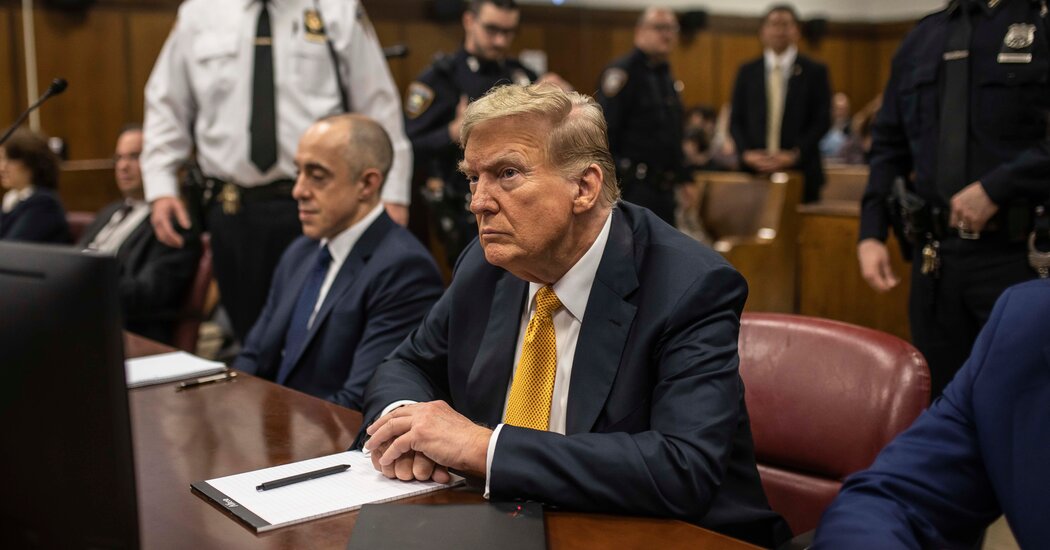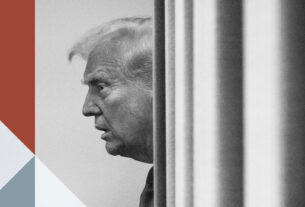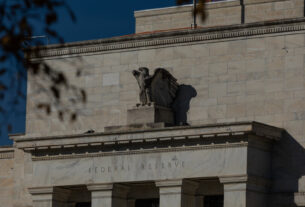President-elect Donald J. Trump on Tuesday intensified a last-minute effort to avoid his criminal sentencing in New York, urging an appeals court to intervene and halt the proceeding.
In a filing with the First Department of the state’s Appellate Division, Mr. Trump’s lawyers sought an emergency stay of the sentencing, which is scheduled for Friday, 10 days before his presidential inauguration. The lawyers argued that Mr. Trump was entitled to full immunity from prosecution, and even sentencing, now that he was the president-elect.
“To go forward with a sentencing, with its inevitable threat of stigma, opprobrium and potential criminal penalties, would pose risks to America’s vital interests that are intolerable and unconstitutional,” wrote one of the lawyers, Todd Blanche.
The appeals court could act swiftly. The emergency request was assigned to a single judge, Ellen Gesmer, who held a hearing at 12:30 p.m. and is expected to issue a ruling before the end of the day.
At the hearing, Justice Gesmer appeared highly skeptical of Mr. Trump’s arguments, asking Mr. Blanche whether he had “any support for a notion that presidential immunity extends to president-elects?”
Mr. Blanche conceded that he did not, saying: “There has never been a case like this before.”
Steven Wu, a lawyer representing the Manhattan district attorney’s office, which prosecuted Mr. Trump, added that Mr. Trump’s claim of immunity was “baseless” and that there was “no support for an automatic stay here.”
Mr. Trump’s effort will not stop with the emergency request. He also filed an action in the appeals court against the trial judge overseeing the case, Juan M. Merchan, challenging two of his recent decisions to uphold a New York jury’s verdict against Mr. Trump.
The filings marked an escalation of Mr. Trump’s long-running effort to fend off sentencing and unwind his conviction, to avoid becoming the first felon to occupy the Oval Office. Ever since the jury convicted him in May on 34 felony counts of falsifying records to cover up a sex scandal, Mr. Trump has attacked the verdict on various fronts, including demanding that Justice Merchan throw out the case.
But the judge declined. And after numerous delays, he scheduled the sentencing, infuriating Mr. Trump, who has attacked the judge and his family since the onset of the case.
Although Justice Merchan signaled that he would spare Mr. Trump jail time or any other substantive punishment, the former and future president vowed to fight the sentencing. And after the judge on Monday declined a final request to cancel it — concluding that Mr. Trump’s lawyers had recycled arguments that had previously failed — the president-elect’s hopes shifted to the New York appeals court.
If the judge grants an interim stay, it might effectively scuttle any chance of sentencing Mr. Trump. A full panel of appellate judges might not have time to take up the matter before Friday, and the window to sentence Mr. Trump is rapidly closing. Once he returns to the White House, Mr. Trump cannot face criminal prosecution.
Even if the appellate judge denies his request on Tuesday, Mr. Trump is not out of options. He could turn to a federal appeals court that is already weighing his request to move the case out of state court. And if that court declines to intervene, the president-elect could also try to persuade the Supreme Court.
The approach reflects one of Mr. Trump’s favorite legal tools: delay.
After being indicted four times in four jurisdictions, Mr. Trump leaned heavily on that strategy, making a variety of appeals and other filings to run out the clock until Election Day.
When he won the election in November, the strategy paid off: The federal special counsel who had brought two of those cases — one in Washington, D.C., and the other in Florida — shut them down, thanks to a Justice Department policy prohibiting prosecutions of sitting presidents. And in Georgia, where Mr. Trump is accused of trying to overturn the state’s 2020 election results, an appeals court disqualified the local prosecutor who brought the case, delaying it indefinitely.
In New York, Justice Merchan delayed the sentencing numerous times. He first postponed it in July to weigh Mr. Trump’s effort to have the case thrown out based on a recent Supreme Court decision granting presidents broad immunity for their official actions. The judge punted again in the fall to accommodate the presidential campaign, and after the election, Justice Merchan paused the sentencing once more to consider the president-elect’s argument that his electoral victory should nullify the case.
But in recent weeks, Justice Merchan picked apart Mr. Trump’s legal arguments.
On Dec. 16, the judge denied Mr. Trump’s request to dismiss the case in light of the Supreme Court’s immunity ruling. While the high court granted former presidents broad immunity for official actions taken in office, the New York case concerned a personal and political crisis that predated Mr. Trump’s presidency: a hush-money payment to a porn star during Mr. Trump’s 2016 campaign. (Mr. Trump, the jury concluded, orchestrated a plan to falsify records that covered up the arrangement.)
And last week, Justice Merchan rejected Mr. Trump’s claim that his election victory should shut down the case altogether, concluding that overturning the jury’s verdict would “undermine the rule of law in immeasurable ways.”
Mr. Trump is now formally challenging those decisions with the appeals court, filing a so-called Article 78 petition against Justice Merchan. It is unclear when the court might take up Mr. Trump’s petition — a special proceeding used to fight decisions made by New York State agencies and judges — but it most likely won’t happen until after Mr. Trump takes office.
Before the election, Mr. Trump was facing up to four years in prison, though legal experts predicted that he would spend no more than a few weeks or months behind bars.
In the ruling last week, Justice Merchan signaled that he favored a so-called unconditional discharge of Mr. Trump’s sentence, a rare and lenient alternative to jail or probation. Unlike a conditional discharge, which allows defendants to avoid punishment if they pay restitution or hold down a job, an unconditional discharge would come without any requirements at all.
That sentence, Justice Merchan wrote in an 18-page decision, “appears to be the most viable solution to ensure finality.”





